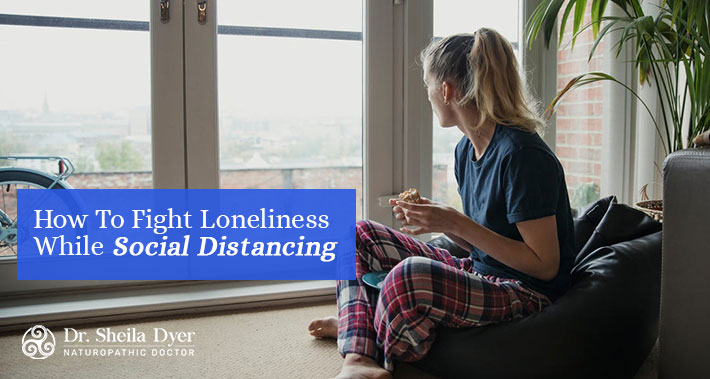The world has changed, seemingly overnight.
As a result of the growing community spread of COVID-19, businesses have closed, people are working from home and events with friends and family are being cancelled.
People who live alone are feeling it harder than others, however, during these tough times, we all need some stress management techniques in order to help us cope with current realities.
Thankfully in this age of technology, it’s easier than ever to maintain contact with loved ones, even when we can’t be together in person.
Keep reading to learn more about why keeping our distance right now is so important, even if it’s hard, and ways to combat feelings of loneliness and connect with others during these tough times.
Why Is Social Distancing Important?
We’ve all heard the calls to practice social or physical distancing.
This means limiting physical contact with others, avoiding crowded places, and keeping a minimum two-metre distance between yourself and other people who don’t live in your household.
As a naturopathic doctor in Toronto, that means my practice has slowed down – though I still see patients for essential needs via telemedicine when necessary.
Social or physical distancing is not just for our own safety, but for the safety of those around us, especially because it is possible to be carrying the virus which causes COVID-19, or SARS-CoV-2, and not have any symptoms of illness.
Scientists at the University of Texas have found that at least ten percent of patients with COVID-19 were infected by someone who was asymptomatic.
Therefore, physical distancing is not just about avoiding catching the virus, but also about avoiding passing along a virus which we may not even realize we have.
Why Is Social Distancing So Difficult?
People are meant to be around other people.
We are a social species, and while some people need more contact than others, it’s human nature to want to be around other people.
This is part of our evolution – we evolved in social groups which has helped us to survive.
We’ve been socialized to cooperate with each other from the early days when we lived in caves, so being told we need to isolate ourselves from those we are closest to is hard for us – even those who tend to prefer their time alone.
What Is Loneliness, Actually?
Human beings have a need to belong to groups, to have companionship.
Loneliness occurs when these needs aren’t met, and when it occurs for long periods of time, it can leave us questioning our self-worth.
Although people are more connected than ever today, through the internet, social media, and other technologies, these are generally seen as a poor substitute for human contact.
There are three types of loneliness which we will explore here.
1. Emotional Loneliness
Emotional loneliness is the feeling of lacking relationships.
It can be especially pronounced when you feel like all of your friends have romantic partners and you are the only one in your peer group who is single.
Another time emotional loneliness is often felt is when you feel like you lack close contacts (romantic or otherwise) who you can share details about your life with.
2. Social Loneliness
Someone feeling social loneliness will often feel they don’t truly belong to groups they’re a part of.
Even if an individual has a close romantic partner, they might feel they lack a wider group of people, such as friends or families who they can lean on for support.
Feelings of social loneliness can be especially pronounced when you’re in a large group of people, but feel like you are alone and have no one you can talk to, for instance at a party where you don’t know anyone.
3. Existential Loneliness
Existential loneliness is a feeling of not being complete, or whole as a human being.
Often people experiencing it will question their role in life, and what meaning their life has.
Resolving existential loneliness often involves a lot of deep reflection and can lead to self-exploration which can be uncomfortable for many people.
It’s Physical Distancing We Need, Not Social
Although the buzzword everyone is talking about lately is “social distancing”, strong social connections are what we need more than ever right now in order to help us cope with an ever-changing world.
Staying connected with the people in our lives will be the key for many of us to get through this uncertain period, even if we can’t be with them in-person.
Here are some ways we can stay connected socially while being separated physically.
1. Schedule Video Chats With Your Coworkers During The Day
OK, be honest now.
When you are in the office for your 8-hour workday, how much of that time is actually spent working, and how much of it is spent catching up with your co-workers?
If we spend the entirety of our workday with our heads buried in work, it hampers relationships and can even squash creativity.
So find ways to bring those casual “water cooler” chats home with you.
Schedule time for informal video chats every day so you can stay caught-up, not about work, but about those other parts of life which you would have discussed if you were in the office like normal.
This can be especially important for those who live alone and might not be getting as much social interaction as those in isolation with families or significant others.
2. Have Lunch Together
For a lot of people who work in an office, there is a lot more to it than just working.
Many teams bond over going for “Pizza Monday”, “Taco Tuesday”, or “Shawarma Friday” at their favourite nearby restaurant.
This allows for an often much-needed break from the workday, and a chance to socialize and get to know your co-workers.
Being forced to work remotely doesn’t mean you can’t still have your team lunches.
Schedule time during the week to “meet” over a video-chat to eat together.
Depending on your team you might also share favourite recipes and plan to all enjoy the same meal even if you can’t be in the same place.
3. Work Together Over Video – Even If It’s Silent
A lot of people shy away from the webcams on their computers.
Many have even gone so far as to put a piece of tape over their camera, just in case it accidentally turns on.
However, some experts suggest having your camera on, and a group video chat going – even if you’re all just working independently and not actually in a meeting – can improve morale and productivity.
It might seem weird at first, but after a while you might just feel like you’re back in the office, working silently side-by-side.
4. Get To Know Your Neighbours – From A Distance
So you won’t be inviting your neighbours over to share a beer or glass of wine anytime soon, but this doesn’t mean you can’t still chat with them – from a safe distance.
Now that the weather is starting to get nicer you can stand on your lawn or driveway and talk from a safe distance, or set up lawn chairs in your respective yards and chat through the fence.
If you live in an apartment building maybe you can chat with people from your balcony, or safely carry on a conversation from down the hall – just as long as you don’t disturb anyone else.
Just remember to always practice physical distancing and not get too close to anyone who doesn’t live in your immediate household.
5. Understand The Real Risks
There is a lot of information floating around the internet and social media in regard to COVID-19.
Some of it credible, some not so much.
It’s important to be sure you are getting your information from a credible source – not a personal testimonial of something that happened to a friend of a friend who you barely know.
Resources are being provided by the Provincial and Federal governments are a good place to start.
Knowing the real risk will help you to make informed, rational decisions rather than acting out of fear.
Book An Appointment With Dr. Sheila Dyer, ND
Are you struggling with stress as a response to the current COVID-19 pandemic situation?
Is being separated from your friends and family extra difficult at this time?
Would you like to explore naturopathic solutions as a way to help manage the stress you might be experiencing right now?
While it is important to recognize that there are no known treatments or cures – naturopathic or otherwise – for COVID-19, there are ways to deal with the excess stress you may be feeling at this time.
I’m Dr. Sheila Dyer, a Toronto-based naturopathic doctor who wants to help.
I can help you to find solutions to manage your anxiety and reduce your stress levels during this difficult time – contact me today for a consultation or to learn more about how naturopathic medicine can help you.
If you have questions about naturopathic medicine, or would like to start with your first consultation, contact me, and let’s book an appointment.
Dr. Sheila Dyer, ND1080 Dovercourt Rd,
Toronto, ON M6H 2X8
(416) 554-5135
► https://g.page/DrSheilaDyerNd
Dr. Sheila Dyer is a Naturopathic Doctor and a practicing registered nurse offering holistic healthcare with a scientific focus

